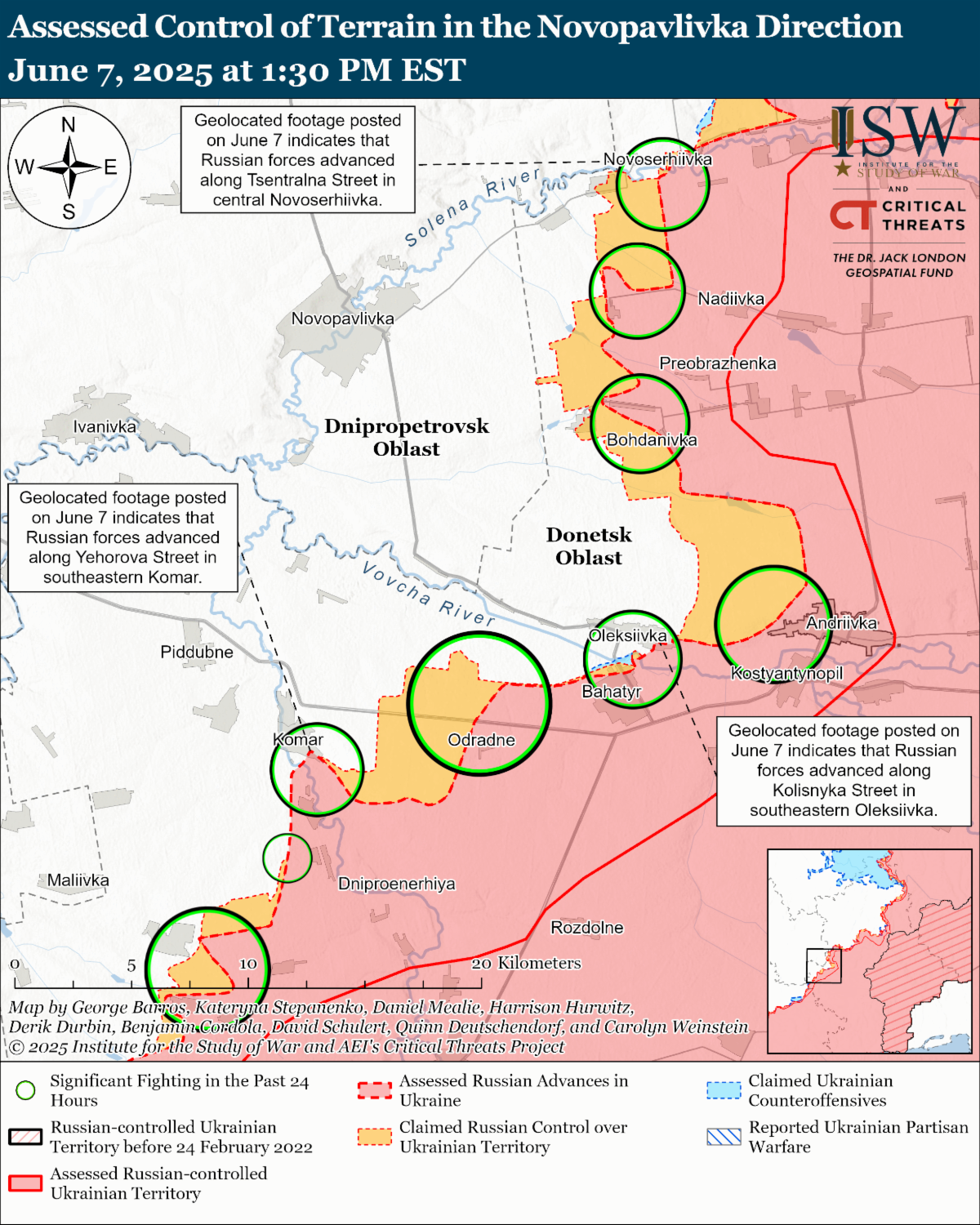Russia baselessly accused Ukraine of failing to conduct a prisoner of war (POW) exchange and to repatriate the bodies of killed in action (KIA) soldiers on June 6 — part of the Kremlin's efforts to undermine mutually agreed upon confidence building measures with Ukraine. Russian Presidential Aide Vladimir Medinsky, Russian First Deputy Chief of Information of the General Staff's Main Directorate (GRU) Alexander Zorin, and Russian Deputy Defense Minister Alexander Fomin claimed on June 7 that Russia was prepared to exchange severely wounded and sick POWs, POWs under the age of 25, and 6,000 bodies of KIA soldiers on June 6 as Russia and Ukraine agreed to during the most recent bilateral talks in Istanbul on June 2. Zorin further claimed that Russian representatives waited for Ukrainian representatives on the border of Belarus to work out the technicalities involved in exchanging the bodies, but that Ukrainian representatives never arrived, and Russian Ministry of Foreign Affairs (MFA) Spokesperson Maria Zakharova and Deputy Chairperson of the Federation Council Committee on International Affairs Andrei Klimov claimed that Ukraine refused to repatriate the KIA bodies. The Ukrainian Coordination Headquarters for the Treatment of POWs refuted Russian officials' claims and clarified that Ukraine and Russia have not yet agreed upon a date for the repatriation of the bodies and that the two parties are still finalizing lists for the POW exchange. The Ukrainian Coordination Headquarters for the Treatment of POWs reiterated that Ukraine remains fully committed to engaging constructively to ensure the successful implementation of the KIA repatriation and POW exchange. The Kremlin remains committed to promoting narratives that vilify Ukraine, likely to socialize its domestic audience ahead of Russia's possible rejection of any peace agreement in the future and to discredit Ukraine on the international stage. The Kremlin's unwillingness to engage in good faith in lower-level confidence building measures designed to facilitate larger peace negotiations further demonstrates Russia's disinterest in peace negotiations.
Russian officials continue efforts to deflect blame away from Russia and onto Western states for the lack of progress toward a peace settlement. Russian Deputy Foreign Minister Sergei Ryabkov accused European states of becoming the main obstacle to negotiating peace in Ukraine, as European states seek to disrupt negotiations on June 6. Ryabkov also claimed that German Chancellor Friedrich Merz opposes peace in Ukraine and is trying to convince US President Donald Trump to return the United States to "the path of escalation" in the war. Ryabkov claimed that the United States is aware that Russia will not stray — even in the face of threats of more sanctions — from its position on the need to eliminate the alleged "root causes" of the war (a phrase which Kremlin officials have repeatedly used to call for regime change in Ukraine and changes to NATO's open-door policy and other unilateral American concessions which the Trump administration described as being “too much“). ISW continues to assess that Russia is uninterested in meaningful negotiations with Ukraine and is very likely setting information conditions to protract or possibly expand the war.
US President Donald Trump signaled on June 6 that he could be willing to increase sanctions against Russia. Russia's economic struggles, however, have been and will continue to be driven by Russian military losses on the battlefield. Maximum US economic pressure against Russia is not possible without continued military sales to Ukraine. Trump stated to reporters on June 6 that he would be willing to "use [The Sanctioning Russia Act of 2025, a bill in the US Senate] if it's necessary" and impose additional sanctions on Russia if Russia demonstrates that it will not "make a deal" or stop fighting. The Sanctioning Russia Act of 2025 has wide bipartisan support in the US Senate and has 82 cosponsors as of June 7.
Key Takeaways:
- Russia baselessly accused Ukraine of failing to conduct a prisoner of war (POW) exchange and to repatriate the bodies of killed in action (KIA) soldiers on June 6 – part of the Kremlin's efforts to undermine mutually agreed upon confidence building measures with Ukraine.
- Russian officials continue efforts to deflect blame away from Russia and onto Western states for the lack of progress toward a peace settlement.
- US President Donald Trump signaled on June 6 that he could be willing to increase sanctions against Russia. Russia's economic struggles, however, have been and will continue to be driven by Russian military losses on the battlefield. Maximum US economic pressure against Russia is not possible without continued military sales to Ukraine.
- Any increased economic pressure against Russia – while a positive policy development – by itself is insufficient to force Russian President Vladimir Putin to the negotiating table or change Putin’s theory of victory.
- Ukrainian forces advanced near Toretsk. Russian forces advanced in northern Sumy Oblast and near Kupyansk, Novopavlivka, Kurakhove, and Velyka Novosilka.
| 




 [ISW] 러시아의 공세 캠페인 평가, 2025년 6월 8일
[ISW] 러시아의 공세 캠페인 평가, 2025년 6월 8일
 [ISW] 러시아의 공세 캠페인 평가, 2025년 6월 6일
[ISW] 러시아의 공세 캠페인 평가, 2025년 6월 6일